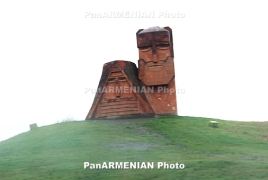
The Human Rights Union of Nagorno-Karabakh Refugees issued a statement in response to recent remarks by Azerbaijani President Ilham Aliyev, who claimed that Armenia should permit a UNESCO mission to conduct monitoring and initiate dialogue regarding the return of the “Western Azerbaijan community.”
The statement asserts that Azerbaijan itself was the initiator in obstructing the implementation of a UNESCO mission in Nagorno-Karabakh.
"President Ilham Aliyev, ignoring reports and resolutions by the European Parliament and interim measures by the International Court of Justice in The Hague—which confirm the deliberate destruction, appropriation, and distortion of Armenian cultural heritage in Nagorno-Karabakh motivated by racial hatred—addressed a conference held in Ankara on May 21. He stated that 'Armenia must abandon territorial claims against neighboring states, take steps to restore and preserve our cultural heritage, allow UNESCO to carry out a monitoring mission, and engage in dialogue on the return of the Western Azerbaijan community.'"
Meanwhile, the European Parliament—one of the world’s most representative democratic institutions—recorded in its 2023/2119(INI) report the forced displacement of nearly 120,000 civilians due to Azerbaijani military attacks in Nagorno-Karabakh, qualifying these acts as ethnic cleansing. A resolution dated October 23, 2024, also documented mass human rights violations. Despite this, Azerbaijan continues to deny its obligations.
Although Azerbaijan thwarted UNESCO’s mission in Nagorno-Karabakh—where it was needed to prevent destruction and document remaining heritage—official Baku now attempts to invoke UNESCO’s mandate in Armenia.
The European Parliament's 2022 resolution (No. 2582) on the destruction of cultural heritage in Nagorno-Karabakh urged Azerbaijan to take action to prevent further destruction and to hold perpetrators accountable. Azerbaijan has consistently refused to acknowledge its involvement and maintains a policy of denial.
At the Ankara conference titled “Return to Western Azerbaijan: a key condition for the supremacy of human rights,” Aliyev claimed that the so-called peaceful initiatives of the Western Azerbaijan community, allegedly based on international law, have gained international recognition. However, the same international community has repeatedly condemned Azerbaijan for grave and systematic human rights violations, the statement said.
The Karabakh Refugees’ Union sharply criticized Azerbaijan’s policies of genocide, hate speech, and fundamental rights violations, as well as the distortion of history and territorial ambitions in blatant disregard of international law. They emphasized that the forced deportation of an entire people, war crimes, and gross breaches of international humanitarian norms must not go unpunished.
The union called on the international community to decisively respond to Azerbaijan’s threats, defend the inalienable rights of the Armenian people, condemn ethnic cleansing, cultural genocide, and historical falsification, and take concrete steps against discrimination and incitement to hatred.
On September 19, 2023, Azerbaijan launched a large-scale attack on Artsakh, subjecting the entire region to intense shelling. A day later, on September 20, the Artsakh authorities accepted a ceasefire proposed by the Russian peacekeeping mission, agreeing to Baku’s terms, including the disarmament of the Defense Army and the dissolution of the Republic of Artsakh. On September 24, mass deportation of Artsakh Armenians began, with over 100,000 forcibly displaced to Armenia. Reports suggest that only about 20 Armenians remain in the region. On September 28, Artsakh President Samvel Shahramanyan signed a decree to dissolve the republic, effective January 1, 2024.

